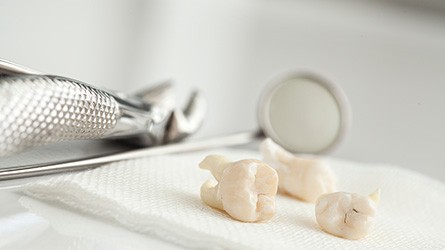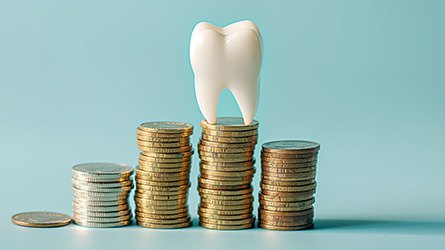Tooth Extractions – Norton, MA
Gentle, Compassionate Tooth Removal
Here at Norton Family Dentistry, we make every reasonable effort to help our patients retain their natural teeth for as long as possible. However, circumstances may arise that make it necessary for us to perform one or more tooth extractions. If we recommend this restorative procedure for you, you can be confident that we will do all we can to help you have a positive care experience. Continue reading below to learn more about how we perform gentle, compassionate tooth removal, and then get in touch with us if you would like to book a consultation.
Why Choose Norton Family Dentistry for Tooth Extractions?
- Only Recommended as a Last Resort
- Compassionate & Empathetic Team
- Dental Insurance Welcomed
Reasons Why Tooth Extractions Are Necessary

There are a number of situations in which we might recommend one or more tooth extractions:
- A tooth is so severely damaged or decayed that restoring it would be impractical or impossible.
- Advanced gum disease has caused one or more teeth to become very loose.
- It is necessary to make more room in the mouth for dentures or orthodontia.
- An infection is present, and tooth removal is the best way to prevent the problem from spreading.
- The wisdom teeth are threatening the health of surrounding tissues.
- One of a child’s baby teeth did not fall out on time and is adversely affecting the development of incoming adult teeth.
The Process of Removing a Tooth

In many cases, the tooth removal process is pretty straightforward. First, we numb your mouth so you will feel little to nothing during the procedure. Then, we use an instrument known as an elevator to lift the tooth from its socket. Gripping the tooth with forceps, we wiggle it in order to break the connective tissues holding it in place. We finish by cleaning out the socket and placing some gauze to control bleeding.
As part of the tooth extraction process, we often discuss tooth replacement options, which can help to prevent oral health complications in the future.
Tooth Extraction Aftercare

It can take anywhere from a few days to a couple of weeks to recover from a tooth extraction. To facilitate a smooth healing process, you should:
- Take prescribed/recommended medications as directed by our team.
- Keep your head elevated when you rest.
- Use a cold compress to minimize swelling.
- After the first 24 hours, start rinsing your mouth with warm salt water. (Do not vigorously swish or spit. It is important to be gentle!)
- Get plenty of rest.
- Do not smoke, drink alcohol, or chew tobacco.
- Attend all recommended follow-up appointments, including those that focus on tooth replacement.
- Give us a call if you run into any questions or concerns while you are recovering.
Understanding the Cost of Tooth Extractions

Now that you understand why you might need a tooth extraction and how the process usually works, it’s natural to have questions about the cost. The price of your procedure depends on your unique circumstances, so before we can provide a quote, you must schedule a consultation with one of our experts. After examining your current dental condition, we’ll walk you through a detailed estimate for your approval before moving forward.
Continue reading to learn the different factors considered when calculating the final amount due, and feel free to contact us if you have additional questions.
Factors That Can Affect Tooth Extraction Cost

It’s difficult to anticipate how much you’ll owe for your procedure until we examine the tooth in question because your unique situation impacts the pricing. Certain elements must be taken into account, including:
- The tooth’s location. Molars are harder to access and have more roots, so they may require additional time and resources to take out, which can increase the total.
- How many teeth require removal. Having multiple teeth taken out can drive up the final amount.
- The type of extraction. A simple extraction with forceps has fewer associated fees than a complex surgical extraction.
- The type of restoration. You can typically expect more to pay for a dental implant to replace your extracted tooth than a dental bridge or dentures, though they also tend to last longer.
Does Dental Insurance Cover Tooth Extractions?

Many dental insurance policies contribute to about 50% of the cost of major procedures like extractions once your annual deductible is met. That said, your plan might have different coverage and qualifications, so verifying your details is a good idea. For example, you might have a waiting period that must pass before benefits kick in, or only a limited number of teeth can be treated.
If you’re struggling to find the information about your policy, our friendly office staff are more than happy to assist you! They’re familiar with many different plans and can help you maximize your benefits.
How to Make Tooth Extractions Affordable

Sometimes, having a tooth extracted is the best way to preserve oral health, and we don’t want your budget to prevent you from undergoing a procedure that’s essential for your well-being. However, our team also understands that not everyone carries a dental insurance policy.
If you’re concerned about the cost of having your teeth removed, you can apply for a flexible financing plan with CareCredit. If your application is approved, this plan allows you to break up your total invoice into more manageable monthly installments.
You can also inquire whether any current promotions or specials, like our current $79 comprehensive exam and X-ray offer, can be applied to your account.
Tooth Extractions
Does Getting a Tooth Extracted Hurt?
Fear of pain is a common reason many patients skip important oral health treatments. Fortunately, whether you’ll be having one tooth extracted or multiple, the first step is always the same: numbing your mouth.
Following the procedure, some soreness and discomfort is expected, however abiding by your aftercare instructions can help promote healing, reduce swelling, and prevent infection.
Should your pain worsen or you notice signs of infection (such as a fever), contact Norton Family Dentistry as soon as possible.
Is There an Alternative to a Tooth Extraction?
While nobody wants to need a tooth extracted, rest assured that if your dentist has recommended removal, there are no other viable options available. At Norton Family Dentistry, our top priority is always to save your natural teeth if possible.
Whether there is an alternative to having your tooth extracted depends on the reason your dentist is recommending it. If it’s due to decay, a root canal may be a possibility. For an issue like periodontal disease, you may benefit from root scaling and planing. If these options are not sufficient, extraction is likely the safest option.
What’s the Difference Between Tooth Extractions and Wisdom Tooth Surgery?
While they both involve extracting a tooth, wisdom tooth surgery and tooth extractions are different procedures.
While wisdom tooth surgery is designed to remove only your wisdom teeth, tooth extractions can be done on any tooth that is irreparably damaged or causing overcrowding. Wisdom tooth surgery is also considered a surgical procedure because third molars frequently need to be removed from below the gumline.
Can I Leave the Space Empty After a Tooth Extraction?
If the tooth that requires extraction is positioned in the back of the mouth, it’s easy to believe that you don’t need to replace it, but just because “no one will know” it’s missing doesn’t mean your tooth isn’t necessary. All teeth are important for chewing and properly enunciating words, and even missing just one tooth can make it difficult to speak and chew. This can lead to everything from poor self-esteem to malnutrition.
Thus, replacing lost teeth is recommended once you have finished healing. Your dentist can discuss your restoration options following your procedure. Available restorations depend on the condition of your oral health, your budget, and the number of teeth you need to replace.



